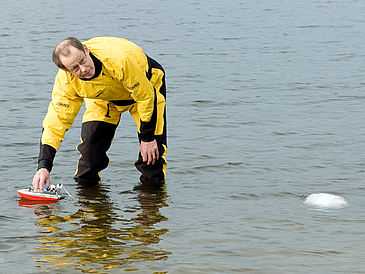When on a bleak and overcast day a Bremen professor wades into the chilly waters of the campus lake, it can only be in the interest of science, and to find solutions for pressing issues of our time. Clad in a dry-suit—which he otherwise wears when canoeing—and carrying a block of ice and a toy boat, last Thursday Justus Notholt ventured into the water. The Professor of Environmental Physics in Faculty 1 Physics/Electrical Engineering at the University of Bremen was attempting to find out just how feasible it would be to have an iceberg towed through the ocean.
Behind the idea is a theory developed by the French engineer George Mougin concerning the gigantic reserves of drinking water that lie in deep-frozen storage in the icebergs of the Arctic and Antarctic. He believes these huge reserves could one day provide the whole of humanity with drinking water. Only problem: How to get the iceberg to the regions that desperately need it? No small logistical task!
In order to find out whether it can really be done, a TV team working for the program “Planetopia” turned to the ice specialist Prof. Heinrich Miller from the Alfred Wegener Institute in Bremerhaven and the environmental physicist, Prof. Notholt of the University of Bremen. Notholt thought up an amusing experiment: a 10-litre block of ice was to function as the iceberg, and the tug vessel would be a motorized toy boat.
Around lunchtime, everything was ready to go: The block of ice was lowered into the water and attached with a cord to the Playmobil boat. Then the observation phase began. Initially, nothing much happened at all. The block of ice turned round and round, only moving very slightly forward. Although its size and motorized power had been calculated exactly to scale, the boat was hardly able to tow the ice block through the water.
Real icebergs can weigh as much as seven billion tons, and up to 9/10 is under the surface. The admittedly not-too-serious scientific experiment is an indication, though, of just how difficult and complex a challenge it would be to transport an iceberg from the Arctic, for instance, to the coast of North Africa.
The experiment was arranged and filmed for the TV program “Planetopia”. The program will not be broadcast under mid-December at the earliest, and we will inform you here of the exact time it will appear.
Prof.Dr.Justus Notholt
Institut für Umweltphysik
Universität Bremen, FB 1
Postfach 33 04 40
28334 Bremen
Phone: +49 421-218-62190
Fax: +49 421-218-4555
e-mail: notholtprotect me ?!uni-bremenprotect me ?!.de


